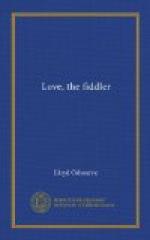“Well, I pulled the great cheap grocer out of the East River,” I said. “There was certainly a greenback in that tea,” and I took another look at my medal, and began to laugh all over again.
“There’s no reason why you should ever have another grocery bill,” said the boarder. “That is, if flavour cuts no figure with you, and you’d rather eat condemned army stores than not!”
I sat down and wrote a letter of thanks. It was rather a nice letter, for I could not but feel pleased at the old fellow’s gratitude, even if it were a trifle overdone, and, when all’s said, it was undoubtedly a fault on the right side. I disclaimed the heroism, and bantered him good-naturedly about the medal, which, of course, I said I would value tremendously and wear on appropriate occasions. I wondered at the time what occasion could be appropriate to decorate one’s self with a gold saucer covered with lies—but, naturally, I didn’t go into that to him. When you accept a solid chunk of gold you might as well be handsome about it, and I piled it on about his being long spared to his family and to a world that wouldn’t know how to get along without him. Yes, it was a stunning letter, and I’ve often had the pleasure of reading it since in a splendid frame below my photograph.
I had been a month or more in New York, and December was already well advanced before I looked up my Grossenstecks, which I did one late afternoon as I happened to be passing in their direction. It was a house of forbidding splendour, on the Fifth Avenue side of Central Park, and, as I trod its marble halls, I could not but repeat to myself: “Behold, the grocer’s dream!” But I could make no criticism of my reception by Mrs. Grossensteck and Teresa, whom I found at home and delighted to see me. Mrs. Grossensteck was a stout, jolly, motherly woman, common, of course,—but, if you can understand what I mean,—common in a nice way, and honest and unpretentious and likable. Teresa, whom I had scarcely noticed on the night of the accident, was a charmingly pretty girl of eighteen, very chic and gay, with pleasant manners and a contagious laugh. She had arrived at obviously the turn of the Grossensteck fortunes, and might, in refinement and everything else, have belonged to another clay. How often one sees that in America, the land above others of social contrast, where, in the same family, there are often three separate degrees of caste.
Well, to get along with my visit. I liked them and they liked me, and I returned later the same evening to dine and meet papa. I found him as impassionedly grateful as before, and with a tale that trespassed even further on the incredible, and after dinner we all sat around a log fire and talked ourselves into a sort of intimacy. They were wonderfully good people, and though we hadn’t a word in common, nor an idea, we somehow managed to hit it off, as one often can with those who are unaffectedly frank and simple. I had to cry over the death of little Hermann in the steerage (when they had first come to America twenty years ago), and how Grossensteck had sneaked gingersnaps from the slop-baskets of the saloon.




